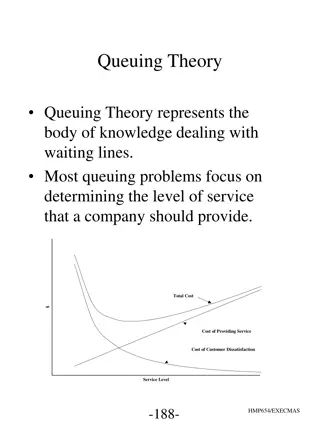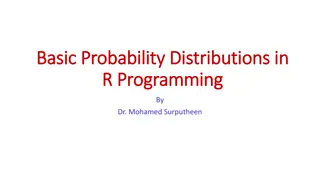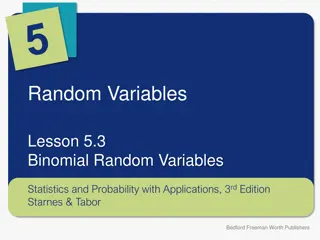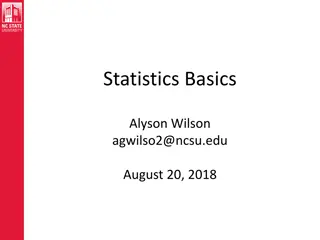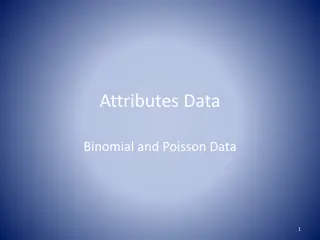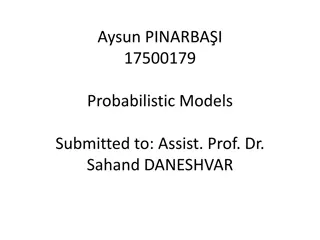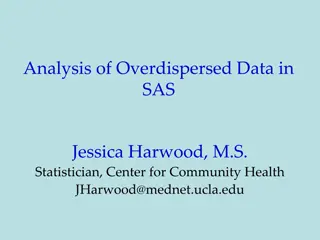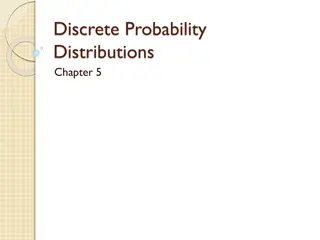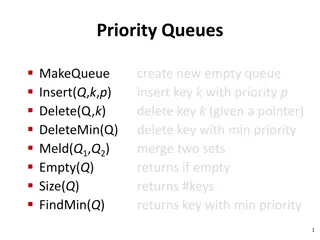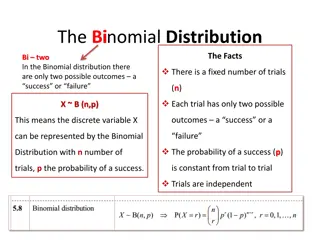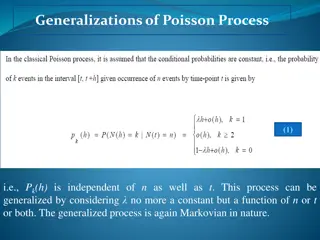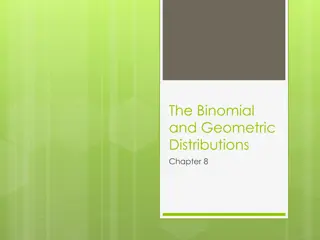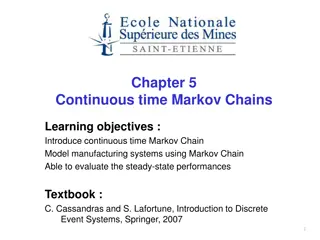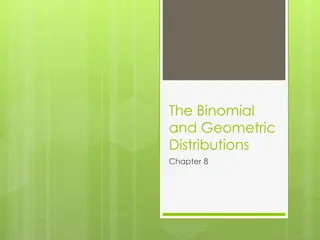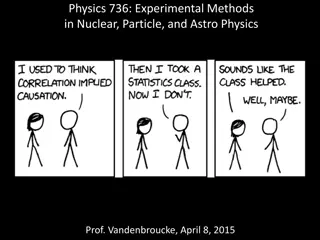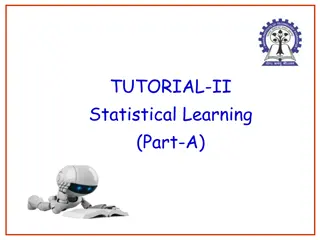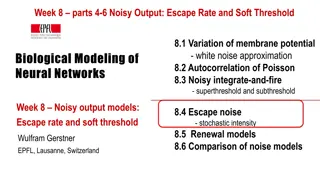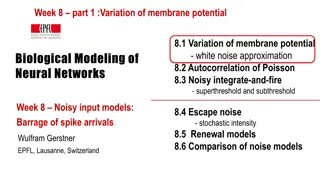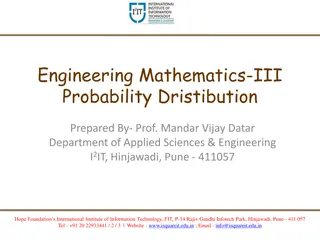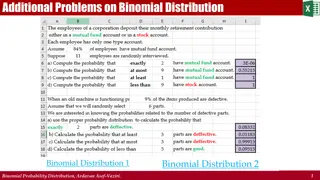Understanding Binomial Distribution in R Programming
Probability distributions play a crucial role in data analysis, and R programming provides built-in functions for handling various distributions. The binomial distribution, a discrete distribution describing the number of successes in a fixed number of trials, is commonly used in statistical analysi
14 views • 30 slides
Understanding the Rule of Mixtures in Composite Materials
The Rule of Mixtures (ROM) is a weighted method for predicting the properties of composite materials, such as fiber-reinforced polymers (FRP). This method relies on assumptions regarding the homogeneity and properties of fibers and matrices. By combining volume fraction and properties linearly, the
5 views • 23 slides
Understanding Binomial Experiments and Probability Calculations
Binomial experiments have specific conditions to be met, such as fixed trials and two outcomes. Symbols and notations help represent these experiments. Calculating probabilities of successes in trials involves using functions like binompdf and binomcdf. Examples like determining defective switches o
11 views • 8 slides
Understanding Queuing Theory and its Characteristics
Queuing Theory is the study of waiting lines and service levels in businesses. It involves analyzing customer arrival patterns, service configurations, and queuing processes such as FIFO vs. LIFO disciplines. Characteristics include the generation of customers, homogeneity of populations, and determ
1 views • 25 slides
Understanding Negative Binomial Distribution in Probability Theory
Exploring the Negative Binomial Distribution in probability theory can help us analyze scenarios where multiple trials are needed to achieve a certain number of successes. This distribution provides insights into situations like playing carnival games or conducting independent trials with varying su
0 views • 39 slides
Understanding the Binomial Theorem
An explanation of binomials, Pascal's Triangle, and the Binomial Theorem with examples and applications in algebra. Special cases and series expansions are covered, providing insights into the manipulation of binomial expressions for various powers and applications. The content illustrates the expan
1 views • 8 slides
Binomial Expansion: Introduction and Examples
Explore binomial expansion basics, Pascal's Triangle, and examples like expanding expressions with ascending or descending powers. Understand the coefficients, powers of terms, and how to find specific terms in the expansion. Get a glimpse of binomial expansion before delving deeper into Year 12 mat
2 views • 10 slides
Understanding Binomial Theorem in Mathematics
Explore the Binomial Theorem in mathematics, covering Pascal's Triangle, binomial expansions, coefficients, general terms, and more. Learn how to expand binomials, analyze powers, find approximate numbers, and determine middle terms. Discover the structure of Pascal's Triangle and apply it to expand
0 views • 37 slides
Understanding Binomial Distribution in R Programming
Probability distributions play a crucial role in data analysis, with the binomial distribution being a key one in R. This distribution helps describe the number of successes in a fixed number of trials with two possible outcomes. Learn about the properties, probability computations, mean, variance,
2 views • 30 slides
Understanding Binomial Random Variables in Statistics
Binomial random variables arise when independent trials of the same chance process are conducted and the number of successes is recorded based on specific conditions. This lesson covers the characteristics of a binomial setting, such as binary outcomes, independence of trials, fixed number of trials
0 views • 14 slides
Understanding the Binomial Option Pricing Model
This chapter delves into the fundamental concept of option pricing models, specifically focusing on the Binomial Model. An option pricing model serves as a mathematical framework to calculate the fair value of an option based on certain inputs. The ultimate goal is to determine the theoretical fair
2 views • 38 slides
Exploring Binomial and Poisson Distributions in Probability Theory
Understand the fundamentals of binomial and Poisson distributions through practical examples involving oil reserve exploration and dice rolling. Learn how to calculate the mean, variance, and expected outcomes of random variables in these distributions using formulas and probability concepts.
0 views • 13 slides
Understanding Basic Concepts in Statistics
This content covers fundamental concepts in statistics such as populations, samples, models, and probability distributions. It explains the differences between populations and samples, the importance of models in describing populations, and discusses various distributions like the normal and Poisson
0 views • 42 slides
Understanding Binomial and Poisson Data Analysis
Discrete data, including Binomial and Poisson data, plays a crucial role in statistical analysis. This content explores the nature of discrete data, the concepts of Binomial and Poisson data, assumptions for Binomial distribution, mean, standard deviation, examples, and considerations for charting a
2 views • 31 slides
Understanding Probabilistic Models: Examples and Solutions
This content delves into probabilistic models, focusing on computing probabilities by conditioning, independent random variables, and Poisson distributions. Examples and solutions are provided to enhance understanding and application. It covers scenarios such as accidents in an insurance company, ge
0 views • 12 slides
Understanding Renewal Processes in Continuous Time
Renewal theory is a branch of probability theory that extends Poisson processes for various inter-arrival times. A renewal process models randomly occurring events over time, such as customer arrivals at a service station or natural phenomena like earthquakes. This article delves into the concept of
0 views • 20 slides
Understanding Overdispersed Data in SAS for Regression Analysis
Explore the concept of overdispersion in count and binary data, its causes, consequences, and how to account for it in regression analysis using SAS. Learn about Poisson and binomial distributions, along with common techniques like Poisson regression and logistic regression. Gain insights into handl
0 views • 61 slides
Understanding Invariance in Posterior Distributions
Exploring the insensitivity of posterior distributions to variations in prior distributions using a Poisson model applied to pancreas data. The analysis involves calculating posterior mean and standard deviation with different Gamma prior distributions. Results showcase minimal change in outcomes ac
0 views • 7 slides
Understanding Discrete Probability Distributions
Explore the definition of random variables, probability distributions, and three types of discrete distributions - Binomial, Hypergeometric, and Poisson. Learn about the mean, variance, and standard deviation of probability distributions, as well as the difference between discrete and continuous dis
3 views • 32 slides
Priority Queues: Operations and Implementations
Priority queues are data structures that allow efficient insertion, deletion, and retrieval of elements based on their priority. This information-rich content covers various aspects of priority queues, including ideal times, binomial queues, Dijkstra's algorithm for single-source shortest paths, and
0 views • 11 slides
Understanding Binomial Distribution in Statistics
Exploring the concepts of binomial distribution in statistics through practical examples and analyses of combined test scores, probabilities, and experimental properties. Dive into the fundamentals of binary outcomes, independence, fixed trials, and constant probabilities. Challenge your understandi
0 views • 26 slides
Covariant Phase Space Formalism in Nonabelian Gauge Theories
The presentation focuses on the covariant phase space formalism in nonabelian gauge theories, aiming to derive the symplectic form and Poisson/Dirac brackets systematically from the Lagrangian. By applying canonical quantization methods, the structure of the infrared sector in such theories can be d
0 views • 42 slides
Analysis of Mosquito Collection Data: Net Weight, Water Coating, and Model Fitting
This analysis includes tables detailing the weight of batch 13 nets, mean water and insecticide for coating the net, model fitting of Poisson models for mosquito count dataset, and modeling fitting of ZIP and ZINB models for trap collection data. The tables provide valuable insights into net propert
0 views • 5 slides
Understanding Geometric and Poisson Probability Distributions
Explore the geometric and Poisson probability distributions, including criteria for geometric random variables, formulas, and practical examples. Learn how to calculate probabilities using the geometric distribution and apply it in scenarios like Russian Roulette and blood donor collection. Dive int
0 views • 13 slides
Understanding the Binomial Distribution and Probability Calculations
The binomial distribution involves two possible outcomes, success or failure, in a fixed number of trials with a constant probability of success. Examples and probability-based questions illustrate how to calculate probabilities using the binomial distribution and tree diagrams.
0 views • 14 slides
State Crime Lab Drug Sampling Protocols
Using the State Crime Lab's drug sampling protocols for defense involves understanding three sampling methods: administrative sample selection, threshold sample selection, and hypergeometric sampling plan. The hypergeometric plan allows experts to make assumptions about the chemical composition of u
0 views • 30 slides
Birth and Death Processes in Population Dynamics
Birth and death processes in population dynamics involve the concept of how organisms reproduce and die, leading to changes in population size over time. These processes can be generalized from the Poisson process and are crucial in queuing theory and modeling dynamic systems. The differential-diffe
0 views • 20 slides
Understanding Binomial and Geometric Distributions in Statistics
This chapter delves into the Binomial Distribution, detailing properties of a binomial experiment where there are n repeated trials with two possible outcomes. It explains the notation, examples, and scenarios to distinguish between binomial and non-binomial experiments, providing a comprehensive un
0 views • 28 slides
Understanding Continuous-Time Markov Chains in Manufacturing Systems
Explore the world of Continuous-Time Markov Chains (CTMC) in manufacturing systems through the lens of stochastic processes and performance analysis. Learn about basic definitions, characteristics, and behaviors of CTMC, including homogeneous CTMC and Poisson arrivals. Gain insights into the memoryl
0 views • 50 slides
Understanding Binomial and Geometric Distributions
The content discusses the properties and examples of binomial experiments, highlighting the key concepts of success, failure, probability, notation, and independence. It explains how to determine if a scenario follows a binomial distribution and provides insightful examples to clarify the concept. A
0 views • 27 slides
Understanding Statistical Distributions in Physics
Exploring the connections between binomial, Poisson, and Gaussian distributions, this material delves into probabilities, change of variables, and cumulative distribution functions within the context of experimental methods in nuclear, particle, and astro physics. Gain insights into key concepts, su
0 views • 13 slides
Statistical Learning: Discrete Random Variables and Distributions
Explore the concepts related to discrete random variables and their corresponding probability density functions, such as Poisson Distribution and Binomial Distribution. Understand the implications of negative values in random variables, calculate expected values, and grasp the relationships between
0 views • 16 slides
Understanding Binomial Theorem: Expansion, Examples, and Applications
Binomial theorem is a powerful mathematical concept used to expand expressions involving binomials. This presentation explores the basics of binomial expansion, formulae for positive, negative, and fractional indices, along with examples demonstrating its application. By leveraging the binomial theo
0 views • 10 slides
Computational Earth Science: Solving Heat Flow in Objects with Complex Shapes Using Finite Difference Method
Explore projects involving the Finite Difference Method for solving static heat conduction problems, also known as the Poisson Equation. Topics include testing boundary conditions, symmetry of solutions, point sources, dipoles, and more. Gain insights into changing boundary conditions and understand
0 views • 20 slides
Exploring Noisy Output in Neural Networks: From Escape Rate to Soft Threshold
Delve into the intricacies of noisy output in neural networks through topics such as the variation of membrane potential with white noise approximation, autocorrelation of Poisson processes, and the effects of noise on integrate-and-fire systems, both superthreshold and subthreshold. This exploratio
0 views • 34 slides
Exploring Membrane Potential Variations in Neural Networks
Delve into the dynamics of membrane potential variations in neural networks through topics like white noise approximation, autocorrelation of Poisson processes, and the Noisy Integrate-and-Fire model. Investigate how these variations manifest at different thresholds, shedding light on the biological
0 views • 63 slides
Understanding Probability Distributions in Engineering Mathematics-III
Explore the concept of random variables, types of distributions such as binomial, hypergeometric, and Poisson, and the distinction between discrete and continuous variables. Enhance your knowledge of probability distributions with practical examples and application scenarios.
0 views • 57 slides
Pricing European Call Option Using Binomial Tree Model
A detailed explanation of using a binomial tree model to price a European call option for a stock with two possible future prices. By constructing a riskless portfolio and utilizing the no-arbitrage assumption, the option price is determined based on different stock price outcomes, ensuring risk neu
0 views • 17 slides
Distribution Functions & Examples in Statistics
Explore distribution functions in statistics including binomial, Poisson, exponential, and normal distributions. Examples demonstrate calculations for probabilities, means, variances, and using distribution approximations. Understand concepts through practical scenarios like airplane hits, coin flip
0 views • 15 slides
Understanding Binomial Distribution: Examples and Visualizations
Explore various problems and examples related to the binomial distribution, including calculating probabilities, approximations using Poisson distribution, and visual representations. Discover how binomial distribution tends towards normal under different conditions and learn how to solve problems u
0 views • 9 slides



